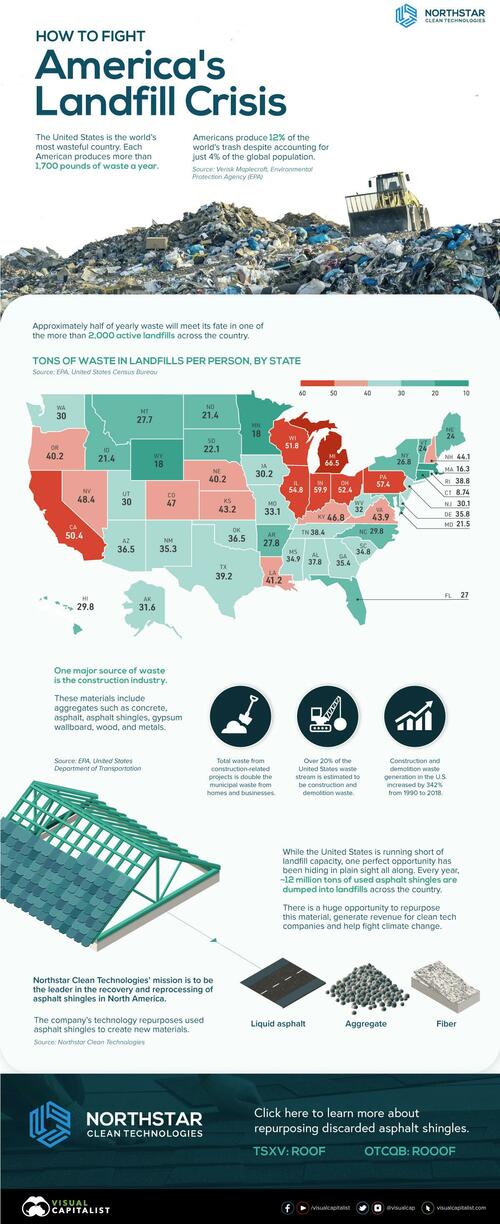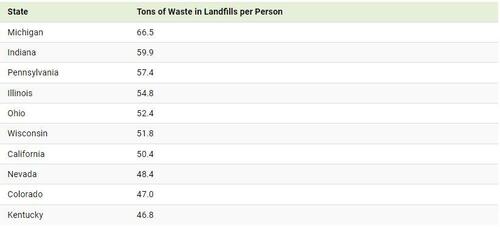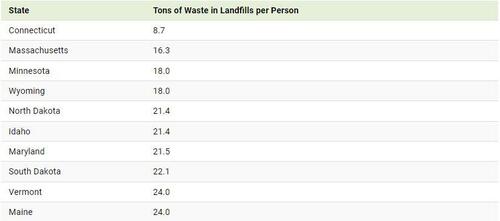
Each American produces a whopping 1,700 pounds of waste every year, making the United States the world’s most wasteful country.
As Visual Capitalist's Bruno Venditti details below, approximately half of the country’s yearly waste will meet its fate in one of the more than 2,000 active landfills across the nation.
In this graphic by Northstar Clean Technologies, we map and compare different states’ landfill waste per capita, using data from the U.S. Environmental Protection Agency.
States With Highest Tons of Waste Per Person
Upper Midwestern and eastern industrial states rank highly on the trash-per-capita list, with Michigan, Indiana, Pennsylvania, Illinois, and Ohio taking the top five spots.
The availability of cheap landfill space in Michigan attracts trucked-in garbage from out of state and even from Canada. That’s because, under the Commerce Clause of the U.S. Constitution, waste is considered a commodity, and states and counties cannot restrict its import or export from other states or even other countries.
The state also faces challenges with recycling. Michigan’s statewide recycling rate is around 18%, while the national recycling rate is 32%.
Some states are accumulating new landfill waste faster than others. Indiana leads the nation with an annual “landfill waste acceptance rate” of 2.35 tons per year per resident.
States with Fewest Tons of Waste Per Person
More sparsely populated states such as Wyoming, Idaho, Maine, Vermont, and North and South Dakota, all rank among the states with the least landfill trash per resident.
Largely because it accepts considerably less trash by volume than most other states, Connecticut hosts the least buried trash per person, with only 8.7 tons per resident.
Food waste, plastics, and paper products make up more than half the garbage in U.S. landfills but other products like glass and metals, for example, can have a significant impact on the environment.
A Multi-Billion Dollar Opportunity
One of the major sources of waste is the construction industry. Every year, around 12 million tons of used asphalt shingles are dumped into landfills across North America.
However, this material can be repurposed to create new materials like fiber, liquid asphalt, and construction aggregate, generating revenue while fighting climate change. In neighbor Canada, for example, recovering and reprocessing shingles is already a $1.3 billion market.
In this context, repurposing waste has not only become essential to minimizing waste, but also to creating new business opportunities going forward.
Each American produces a whopping 1,700 pounds of waste every year, making the United States the world’s most wasteful country.
As Visual Capitalist’s Bruno Venditti details below, approximately half of the country’s yearly waste will meet its fate in one of the more than 2,000 active landfills across the nation.
In this graphic by Northstar Clean Technologies, we map and compare different states’ landfill waste per capita, using data from the U.S. Environmental Protection Agency.
States With Highest Tons of Waste Per Person
Upper Midwestern and eastern industrial states rank highly on the trash-per-capita list, with Michigan, Indiana, Pennsylvania, Illinois, and Ohio taking the top five spots.
The availability of cheap landfill space in Michigan attracts trucked-in garbage from out of state and even from Canada. That’s because, under the Commerce Clause of the U.S. Constitution, waste is considered a commodity, and states and counties cannot restrict its import or export from other states or even other countries.
The state also faces challenges with recycling. Michigan’s statewide recycling rate is around 18%, while the national recycling rate is 32%.
Some states are accumulating new landfill waste faster than others. Indiana leads the nation with an annual “landfill waste acceptance rate” of 2.35 tons per year per resident.
States with Fewest Tons of Waste Per Person
More sparsely populated states such as Wyoming, Idaho, Maine, Vermont, and North and South Dakota, all rank among the states with the least landfill trash per resident.
Largely because it accepts considerably less trash by volume than most other states, Connecticut hosts the least buried trash per person, with only 8.7 tons per resident.
Food waste, plastics, and paper products make up more than half the garbage in U.S. landfills but other products like glass and metals, for example, can have a significant impact on the environment.
A Multi-Billion Dollar Opportunity
One of the major sources of waste is the construction industry. Every year, around 12 million tons of used asphalt shingles are dumped into landfills across North America.
However, this material can be repurposed to create new materials like fiber, liquid asphalt, and construction aggregate, generating revenue while fighting climate change. In neighbor Canada, for example, recovering and reprocessing shingles is already a $1.3 billion market.
In this context, repurposing waste has not only become essential to minimizing waste, but also to creating new business opportunities going forward.







